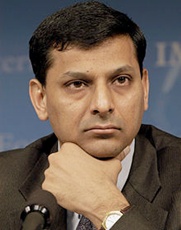Raghuram Rajan vows to safeguard `monetary stability’
05 Sep 2013
New RBI governor Raghuram Rajan on Wednesday announced a slew of measures, including increased currency swaps for trade settlement, in the RBI's ongoing efforts to rescue the rupee from the pits.
 Rajan, who took over as the 23rd governor of the central bank on Wednesday (See: Raghuram Rajan takes over as RBI governor), also said he would doggedly pursue measures to resuscitate the battered rupee, hinting at focused action on the currency front.
Rajan, who took over as the 23rd governor of the central bank on Wednesday (See: Raghuram Rajan takes over as RBI governor), also said he would doggedly pursue measures to resuscitate the battered rupee, hinting at focused action on the currency front.
The Reserve Bank, he said, would announce steps to attract more funds from overseas by subsidising hedging costs for banks and making it easier for importers and exporters to hedge currency risk.
Addressing the media after taking over charge at Mint Road, he laid out a ''big initial package'' of short-term policy measures, both conventional and unconventional, to both defend the rupee and promote economic growth.
He said while transparency and predictability are the bedrock of RBI's policies, the central bank should at times take measures to influence markets.
''At a time when financial market are volatile, and there is some domestic political uncertainty because of impending elections, the Reserve Bank of India should be a beacon of stability as to its objectives,'' he said, adding, ''That is not to say we will never surprise markets with actions.''
The new governor also postponed the announcement of his first monetary policy statement to 20 September so as to better assess the situation after the US Fed meeting on the 17th and 18th and consider all major developments in the required detail.
Rajan, however, emphasised that the primary role of the central bank, as the Act suggests, is monetary stability, that is, to sustain confidence in the value of the country's currency unit.
The role of the RBI is ''to regulate the issue of Bank notes and the keeping of reserves with a view to securing monetary stability in India and generally to operate the currency and credit system of the country to its advantage.''
Ultimately, this means low and stable expectations of inflation, whether that inflation stems from domestic sources or from changes in the value of the currency, from supply constraints or demand pressures, he added.
The new governor also announced plans for setting up a panel consisting of RBI deputy governor Urjit Patel and other RBI staff along with outside experts to come up with suggestions in three months on what needs to be done to revise and strengthen our monetary policy framework.
Deepening financial markets
Rajan said there was a need to add depth to financial markets to help them play their necessary roles of providing risk absorbing long term finance, and of generating information about investment opportunities.
''Better that investors take positions domestically and provide depth and profits to our economy than they take our markets to foreign shores,'' Rajan remarked.
''Together with the government and regulators such as SEBI, we will steadily but surely liberalise our markets, as well as restrictions on investment and position taking.''
However, he said, ''Given the current market turmoil, our actions will have to be at a measured pace, but as a symbolic down payment, we will do the following:
- Enhance the limit available to exporters to 50 per cent; and allow a similar facility to importers to the extent of 25 per cent;
- Further, to develop the money and G-sec markets, RBI will introduce cash settled 10 year interest rate future contracts; and
- Examine the introduction of interest rate futures on overnight interest rates.
Rajan said there was a need to internationalise the rupee at a time when the country's trade is expanding. ''As our trade expands, we will push for more settlement in rupees,'' he said, adding, ''This will also mean that we will have to open up our financial markets more for those who receive rupees to invest it back in. We intend to continue the path of steady liberalisation.''
He said the RBI has been receiving requests from banks to consider a special concessional window for swapping FCNR deposits that will be mobilised following the recent relaxations permitted by the central bank. We will offer such a window to the banks to swap the fresh FCNR (B) dollar funds, mobilised for a minimum tenor of three years and over, at a fixed rate of 3.5 per cent per annum for the tenor of the deposit.
Further, he said, RBI has decided to allow banks a higher overseas borrowing limit from the current 50 per cent of the unimpaired Tier I capital to 100 per cent and allow swapping of the borrowings at the option of the bank at a concessional rate of 100 basis points below the ongoing swap rate prevailing in the market.
The schemes will be open up to 30 November 2013, which coincides with when the relaxations on NRI deposits expire. The RBI, however, has the option to close the scheme earlier with due notice.


















